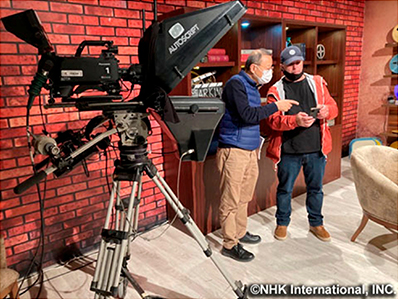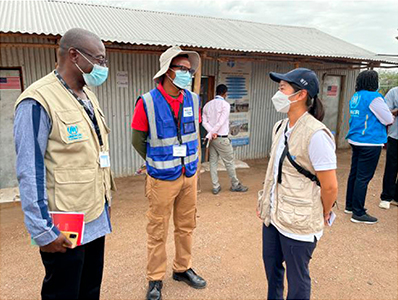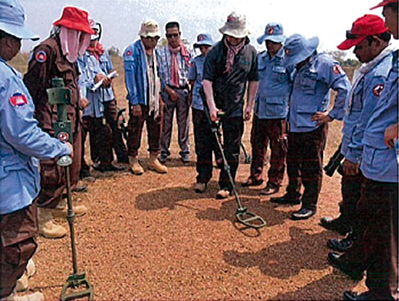2-2 Assistance for Ensuring Peace, Stability, and Security
(1) Support for Peacebuilding and Refugees/Displaced Persons

Conducting training on studio cameras at Radio Television of Kosovo (Photo: NHK Foundation)
Regional and internal conflicts arising from various factors, including ethnic, religious, and historical differences, as well as due to the effects of poverty, disparities, and other such issues, still continue to arise in the international community. In particular, the prolongation of such conflicts has become a challenge in recent years. Such conflicts generate a great number of refugees and displaced persons, resulting in humanitarian crises. These conflicts also undermine the progress in development achieved through long-term efforts, and cause massive economic losses. Furthermore, the effects of a conflict in one country or region spread to the rest of the world in one way or another.
Russia’s aggression against Ukraine, which started in 2022, led to soaring food and energy prices, spurring a serious humanitarian crisis, and having a major negative impact on the global economy, society, and stability (see Part I for Japan’s support related to Ukraine). In recent years, there are concerns about the impact of climate change on peace and stability. As the challenges faced by the international community become more complex and diversified, peacebuilding efforts aimed at establishing the foundations for development are increasingly important for the consolidation of sustainable peace.
● Japan’s Efforts

WFP staff providing food and nutrition assistance to refugees in a refugee camp in Kenya (Photo: WFP)
In response to humanitarian crises caused by conflicts and other causes, Japan promotes the “Humanitarian-Development Nexus” in which urgently needed humanitarian assistance is provided from the initial stage taking into account medium- to long-term development cooperation. As humanitarian crises become more prolonged and diverse, Japan also places importance on the idea of “Humanitarian-Development-Peace Nexus,” in which assistance is provided for sustained peace through resilient nation-building and social stabilization from a medium- to long-term view even in times of peace. In various countries and regions, Japan seamlessly extends humanitarian assistance, support for poverty reduction and economic development, and peacebuilding and conflict recurrence prevention assistance in order to bolster self-reliant development and address the root causes of crises.
In order to provide seamless assistance, Japan combines different types of support such as assistance through international organizations, grant aid, loan aid, and technical cooperation, and provides humanitarian assistance for refugees and displaced persons affected by conflict, and electoral assistance for post-conflict political peace processes. In addition, to promote the consolidation of peace and prevent the recurrence of conflict, Japan supports the disarmament, demobilization and reintegration (DDR) of ex-combatants, security sector reform, and strengthening of administrative, judicial, and police functions. Furthermore, Japan supports the development of economic infrastructure and institutions, as well as social sectors such as health and education. Japan also extends support for coexistence with host communities, reconstruction in areas such as the repatriation and resettlement of refugees and displaced persons, and the rebuilding of basic infrastructure (socio-economic infrastructure). In these efforts, Japan actively promotes women’s participation in conflict prevention, conflict resolution, and peacebuilding in line with UN Security Council resolutions, including UNSC Resolution 1325, which recognizes the importance of the role of women in peacebuilding.
For example, from 2021 to March 2022, Japan provided various assistance at women’s centers in Gaziantep and Izmir, Turkey. 3,981 female refugees and women in the host community were supported in areas such as legal assistance, information on immigration procedures, health and psychological counseling, and vocational training. Both the refugees and the Turkish communities that accept them are in a difficult economic situation. In light of the need for support for their economic independence, Japan provided training on career development, improved knowledge of finance and how to communicate information on social media, as well as training to acquire skills in toy production through handicrafts. Furthermore, women from different coexisting ethnic groups participated in workshops, short excursions, and other activities, and their awareness about the importance of peaceful coexistence and peacekeeping was raised through repeated opportunities for dialogue.
In the international community, discussions on conflict resolution and prevention, as well as post-conflict recovery and assistance for nation-building, are taking place in forums such as the UN Peacebuilding Commission (PBC). Glossary Japan has been a member of the PBC since its establishment, and has made active contributions by addressing the importance of working to build institutions and to develop human resources, and the need to strengthen cooperation among related organizations (related UN bodies such as the UN Security Council, UN General Assembly, and PBC, donor countries, regional agencies, international financial institutions such as the World Bank and IMF, and the private sector). As of December 2022, Japan contributed a total of 61.3 million US dollars to the UN Peacebuilding Fund (PBF) Glossary and assisted the fund as a major donor. In addition, Japan plans to work on peacebuilding as one of the priorities during its two-year term as a non-permanent member of the Security Council starting from January 2023.
Furthermore, Japan has long made efforts to strengthen coordination between development cooperation and international peace cooperation activities such as UN peacekeeping operations (UN PKOs). In the countries and regions where UN PKOs are deployed, many initiatives are underway that contribute to efforts for protecting refugees/displaced persons, women, and children affected by conflict and developing basic infrastructure. To maximize the effects of such efforts, it remains important for Japan to promote such forms of coordination. For example, in 2021, Japan provided support for capacity building of 200 women in South Sudan for women’s participation in peacebuilding, as well as assistance to victims of gender-based violence to promote efforts toward peace and stability in the country.
Japan proactively contributes to the framework of the “UN Triangular Partnership Programme (TPP),” where three parties, namely the UN, Supporting Member States, and Troop Contributing Countries, cooperate together to conduct training and other activities for uniformed personnel to be dispatched to UN PKO missions. Under this framework, for example, Japan Self Defense Force (JSDF) personnel are dispatched to Africa and Asia to train engineering personnel on the operation of heavy engineering equipment. In the medical care field, Japan dispatches JSDF personnel to conduct life-saving training and contributes to the development of telemedicine systems for UN PKO missions.
■ Support for Refugees and Displaced Persons
Given the situations in Syria, Afghanistan, Myanmar, Ukraine, and other countries, the number of forcibly displaced people including refugees and displaced persons worldwide has been increasing year after year. In 2022, the number reached over 100 million people, the highest level since the end of World War II, and humanitarian situations became increasingly severe. From the viewpoint of human security, Japan provides humanitarian assistance, including assistance for refugees, displaced persons, and others, in order to ensure the life, dignity, and security of the people in the most vulnerable positions and to enable each person to get back on their own feet (see also “Stories from the Field 2”).
In particular, Japan works with international organizations, including the United Nations High Commissioner for Refugees (UNHCR), World Food Programme (WFP), and the International Organization for Migration (IOM) to continue to provide assistance around the world by distributing supplies for basic living needs such as shelter and food. Furthermore, Japan works with the United Nations Relief and Works Agency for Palestine Refugees in the Near East (UNRWA), the International Committee of the Red Cross (ICRC), and other international organizations in addition to the above-mentioned UN organizations, and provides assistance for refugees, displaced persons, and others, even in areas with security concerns by utilizing their expertise and delivering capabilities. For example, in 2021, Japan extended Emergency Grant Aid to Ethiopia through WFP, IOM, and other organizations in order to provide medical supplies, food, etc. in support of internally displaced persons affected by the military engagement in the country.
Upon providing this kind of assistance for refugees, displaced persons, and others through international organizations, Japan promotes cooperation with JICA, NGOs, and private companies. For example, in the case of refugee assistance by UNHCR, UNHCR works in collaboration with JICA to implement a program combining emergency and reconstruction assistance. In addition, Japan provides assistance for refugees, displaced persons, and others in collaboration with Japan Platform (JPF) Note 38 (see also “Cooperation with Japanese NGOs”).
■ Protection and Participation of the Socially Vulnerable
Socially vulnerable people including persons with disabilities caused by conflict or landmines, orphans, widows, ex-combatants including child soldiers, and displaced persons are susceptible to the impact of a conflict. However, the reality remains that assistance for them is delayed in post-conflict recovery and they have difficulty accessing the benefits of peace and reconstruction.
From this perspective, Japan provides support for the social reintegration of child soldiers and the protection and empowerment of children who are the most vulnerable in conflict-affected areas, through UNICEF. For example, Japan supports the social reintegration of former child soldiers in Chad and the protection of children and women who are victims of sexual violence in Ethiopia, Afghanistan, and Myanmar. Japan also provides humanitarian assistance to displaced persons such as orphans and children separated from their families in Ukraine and its neighboring countries.
Through UNHCR, Japan carries out protection activities for refugees and displaced persons, as well as provides the humanitarian assistance that they need. For example, in Yemen, Japan supports developing a system that enables the children of refugees and displaced persons to receive necessary medical and legal protection through assisting birth registration. Meanwhile, in Kenya, Japan implements support to improve refugee camps’ sanitary conditions and strengthen access to safe water.
In addition, in cooperation with UN Women, Japan supports infrastructure development and provides vocational training to ensure sustainable means of livelihood for women and girls living under conflict and natural disaster in the Democratic Republic of the Congo, Mozambique, and other countries.
■ Actions against Anti-personnel Landmines, Unexploded Ordnance, and Illicit Small Arms and Light Weapons

A Japanese expert giving technical guidance for mine detectors in Cambodia (Photo: JICA)
In post-conflict countries and regions, anti-personnel landmines and unexploded ordnance (UXO) remain, and illicit small arms and light weapons are still widely in circulation. These weapons not only harm civilians indiscriminately and hinder reconstruction and development activities, but may also exacerbate conflict. Therefore, it is important to continue cooperation to ensure security and stabilize these countries and regions through assistance for the disposal of anti-personnel landmines and UXOs, appropriate management of small arms and light weapons, and support and capacity building for landmine victims.
As a state party to the “Convention on the Prohibition of the Use, Stockpiling, Production and Transfer of Anti-Personnel Mines and on their Destruction” and the “Convention on Cluster Munitions,” Japan steadily implements international cooperation activities through preventive efforts such as risk reduction education, in addition to mine clearance and victim assistance, from the perspective of the Humanitarian-Development-Peace Nexus. For example, Japan supports upgrading the overall capacity of the Cambodian Mine Action Centre (CMAC) through strengthening of its training capacity at home and abroad, capacity building of administrative staff, and building of information systems so that the CMAC can make further international contributions. Japan decided to support the construction of the CMAC training complex and outreach facility in November 2022 in order to improve the training and educational environment for personnel involved in landmine countermeasures and to promote understanding and raise awareness of landmine issues among visitors. Through such comprehensive support, CMAC provides joint Japan-Cambodia assistance to Ukraine and training for the mine-action staff of third countries such as Colombia and Laos, and thus contributes to the realization of South-South cooperation. Note 39 Japan also contributes to the improvement of connectivity in the Western Balkans by supporting mine clearance activities in Bosnia and Herzegovina conducted by ITF Enhancing Human Security (ITF), an international NGO based in Slovenia, in cooperation with the Bosnia and Herzegovina Mine Action Center.
In Afghanistan, the Association for Aid and Relief, Japan (AAR Japan), a Japanese NGO, implements education projects that support the development of educational materials, conducting seminars, and the like, with the aim of raising awareness on the risks of landmines, UXOs, and other remnants of conflict, and on the appropriate ways of avoiding them, through the Grant Assistance for Japanese NGO Projects (since FY2009) and JPF (since FY2001). The reach of these awareness activities among residents is steadily expanding.
Furthermore, in Laos, a country particularly affected by UXOs, Japan dispatches UXO disposal experts and provides equipment. Specifically, Japan supports the capacity building of organizations that dispose of UXOs, through introducing mechanical bush-cutters and other related materials and equipment needed for UXO disposal and supporting human resources development mainly in the Provinces of Sekong, Salavan, and Champasak, all of which are regions in the country that have endured especially great suffering from UXOs and have high poverty rates.
In addition to providing such bilateral support, Japan is proactively engaged in measures against mines and UXOs through international organizations. In 2022, Japan conducted clearance, risk education, and victim assistance against landmines and UXOs through the United Nations Mine Action Service (UNMAS) in Afghanistan, Syria, Palestine, Sudan, Nigeria, and South Sudan. For example, in Syria, Japan provided assistance to victims of explosive ordnance and worked to formulate a framework for the implementation of assistance to victims through UNMAS. In 2022, Japan also provided support for mine risk reduction education in the Central African Republic, Chad, Iraq, Palestine, South Sudan, Ukraine, and Yemen via UNICEF. It also provides support including risk reduction education in countries and regions such as Afghanistan, Myanmar, Syria, Ukraine, and other countries through the ICRC.
Small arms and light weapons are called “the de-facto weapons of mass destruction” because they are still used in actual conflicts and claim many lives. Japan is the largest donor country to the “Saving Lives Entity (SALIENT),” a UN fund established to embody the commitment made by Secretary General Guterres in “An Agenda for Disarmament (2018),” and actively contributes to the discussions on countermeasures against small arms and light weapons.
■ Human Resources Development for Peacebuilding and Development
Qualities required for those engaged in the field of peace building are increasingly diversified and complex. Through the “Program for Global Human Resource Development for Peacebuilding and Development,” Note 40 Japan cultivates civilian specialists who can make a significant contribution on the ground both in Japan and abroad, and a total of over 900 people have participated in training programs in Japan. Many graduates of these programs are playing active roles in the fields of peacebuilding and development around the world including regions such as Asia and Africa.
Glossary
- UN Peacebuilding Commission (PBC)
- An advisory body to the UN Security Council and the General Assembly established in March 2005. The PBC aims to advise and propose integrated strategies for post-conflict peacebuilding and recovery. It provides advice to the Security Council and the General Assembly, among others through briefings and written submissions. Japan has consistently served as a member of the Organizational Committee, which is a central body of the PBC, since its establishment.
- UN Peacebuilding Fund (PBF)
- A fund established in October 2006. The fund provides assistance in Africa and other regions to prevent the recurrence of regional conflicts and civil wars after their end, and assistance for conflict prevention. Specifically, it supports peace processes and political dialogue, revitalization of economies, institution building of states, and participation of women and youth in nation-building, among other efforts.
- Note 38: See the glossary.
- Note 39: See the glossary.
- Note 40: In FY2007 Japan began the “Program for Human Resource Development for Peacebuilding,” and in FY2015, the program was renewed with expanded content as the “Program for Global Human Resource Development for Peacebuilding and Development” (https://www.mofa.go.jp/mofaj/gaiko/peace_b/j_ikusei_shokai.html (in Japanese only)). The renewed program includes the “Mid-Career Course,” which supports the career advancement of those with a certain degree of practical experience in fields related to peacebuilding and development, in addition to the existing “Primary Course,” which offers training in Japan to acquire the knowledge and skills necessary on the ground and on-the-job training at the field offices of international organizations.
